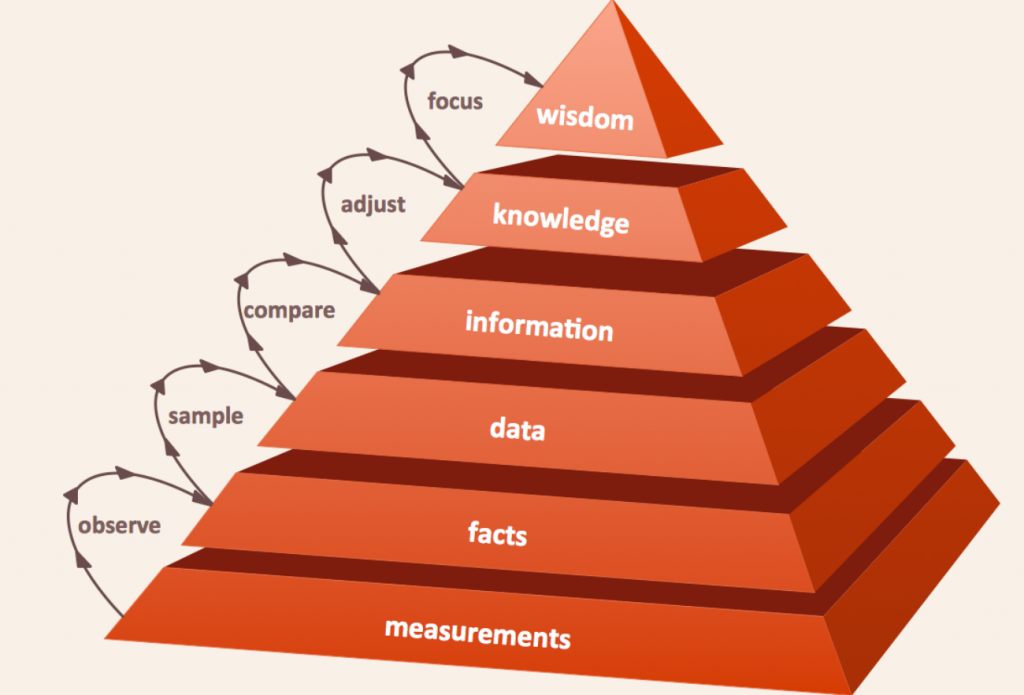Bill Gates, founder of Microsoft, stated: “How you manage information determines whether you win or lose.” When improving decision making in a business, we need to understand the difference between data and information to define our data quality goals.
Data and information are not the same–and they should not be confused.
Just What Is Data?
Data comes from the Latin word datum, meaning “something given.” Over time, the English language has evolved to use data as plural; we amass hundreds of thousands of pieces of “data” in the course of our work.
This gives us our first clue that data represents units of measurement. We store it in bits and bytes, megabytes, gigabytes and more. Data is the 1s and 0s that fill hard drives, and it’s designed to be read by computers–not humans.
What Are the Different Types of Data, and How Are They Categorized?
Data is broadly categorized into two major types: qualitative and quantitative. Understanding these categories is crucial for data analysis across various fields.
Qualitative Data
- Nature: This data type is non-numerical, focusing on characteristics and descriptions. It offers insights into a subject’s qualities or attributes.
- Examples: Qualitative data represents features such as skin texture, eye color, and a dish’s flavor profile. This data is often gathered through observations, interviews, or open-ended survey questions.
Quantitative Data
- Nature: In contrast, quantitative data is all about numbers. This data type quantifies variables and measures “how much” or “how many.”
- Examples: Instances include the number of participants in a study, statistical measurements like height and weight, or test scores. This data is typically collected through structured measurements, questionnaires with closed-ended questions, or automated systems.
By categorizing data into these two groups, researchers, analysts, and businesses can effectively apply different methods to analyze and interpret information, driving meaningful insights and informed decision-making.
The Properties of Data
The interesting properties of data provide a useful litmus test when we’re not sure if it’s data or information we’re faced with.
For example:
- Data is, when clean, a fact.
- Data can be stored easily, and at a low cost.
- Data can be copied easily, often using computerized methods.
- Data can exist in more than one place, so data is often duplicated.
- Data can be modified and moved quickly and simply.
- Data can be misrepresented, depending on its interpretation.
- Data has no value until it is used.
- Data does not mature, nor does it improve with age — in fact, data decays.
All data has to be interpreted to be useful to humans, which leads us to our definition of information.
Understanding Quantitative Data: What It Is and How It’s Measured
Quantitative data is information represented in numerical form. It answers pivotal questions like “how much?” and “how many?” making it essential for statistical analysis and insights.
Characteristics of Quantitative Data
- Numerical Representation: Unlike qualitative data, which focuses on subjective traits and descriptions, quantitative data encapsulates precise, measurable quantities.
- Objective Measurement: This data type is ideal for comparisons and identifying patterns due to its numeric nature.
Common Measurement Methods
- Surveys and Questionnaires: These tools often employ scales and closed-ended questions to quantify opinions or behaviors. For example, respondents might rate their satisfaction on a scale of 1 to 5.
- Scientific Experiments: Controlled experiments frequently use quantitative data to measure variables and test hypotheses, ensuring replicable and valid results.
- Financial Metrics: Quantitative data is critical in finance for tracking revenue, calculating growth rates, and conducting performance analyses.
- Inventory and Sales Tracking: Retailers and manufacturers rely on this data type to manage stock levels and evaluate sales trends over time.
Quantitative data forms the backbone of industry decision-making by offering precise and objective insights into measurable phenomena.
When discussing qualitative data, think of information that captures the qualities or characteristics of something, rather than focusing on numerical values.
Here are a few examples of qualitative data:
- Texture: Imagine describing the plush softness of a velvet couch or the rugged surface of tree bark.
- Color: Consider the deep blue of a clear sky or the vibrant green of freshly cut grass.
- Sounds: Recall the gentle rustling of leaves in the wind or the crisp crunch of autumn leaves underfoot.
- Smells: Think about the smoky aroma of barbecue or the subtle scent of a blooming jasmine flower.
- Visual Aesthetics: Visual cues like a room’s minimalist design or the intricate details of a handcrafted necklace.
Qualitative data can provide rich insights into the world around us by capturing the nuances that numbers might miss. From the comfort of a warm ambiance to the elegance of a classic novel’s prose, these qualitative elements paint a vivid picture that statistics alone simply cannot.
And What Is Information?
The word information has existed in the English language for far longer than the word data. The concept of informing someone is well understood, and that gives us some clues to meaning.
When we talk about data, we think of megabytes of binary code. In contrast, think of all the ways we can measure information. We can use practically any meaningful unit: time, distance, amount, rankings, speed, and weight. We can add additional variants to the units, too (for example, an amount of money in a particular currency).
We can see that information has context. It gives us a fact relative to something else. It offers a yardstick for our decision making. It lets us derive some kind of conclusion once we understand it.
Defining Information
We might refer to information as:
- Data that has been processed to make it useful
- The right information in the right place
- Data plus meaning
- The foundation of correct decisions
- A known fact, or thing, used as a basis for inference or reckoning
- Data in context
To truly understand what constitutes valid information, it’s crucial to consider reliability and verification. Valid information is not just about having data; it’s about ensuring that this data is reliable and has been checked and verified for a specific purpose. Without this process, data remains just that—raw and potentially misleading.
In essence, valid information is both dependable and purposeful. When we talk about information being the foundation of correct decisions, we’re emphasizing the necessity of it being trustworthy. This trustworthiness comes from rigorous verification processes that confirm the data’s accuracy and relevance.
After all, without context, information does not inform. It is the context that transforms raw data into something meaningful and actionable, allowing it to inform and guide decisions effectively.
Where They Fit: The DIKW Pyramid
Think about a date, such as January 1.
What is January 1? What does it mean to you?
Expressed as 01/01, or 01012015, or 20150101, it’s data. Expressed as New Year’s Day, it’s information.
But knowing what we know about the world, we know that New Year’s Day is not always January 1. The knowledge that surrounds the information causes us to deduce that January 1 may or may not mean New Year’s Day.
Wisdom would be knowing which countries use the Gregorian calendar, and which do not.
The process of deduction we’ve followed mirrors the DIKW Pyramid, which describes how data becomes information, becomes knowledge, becomes wisdom.
Consider another example. You are a pilot. The number 10,000 flashes on your display. No label, no description, no units. It is data, but it means nothing to you.
- If the display reads ‘10,000 feet above sea level’, it is information.
- If we are aware of mountains soaring to 12,000 feet, that’s knowledge.
- Choosing to climb above the mountains requires wisdom.
These two examples prove that every layer in the DIKW Pyramid is founded on the accuracy of the data below it. The bits and base form a foundation on which our information, knowledge, and wisdom are balanced.
Had the pilot’s display read 13,000, his or her decision making would have been wrong, based on the fact that the data resulted in an inaccurate assessment of the situation. This is why data quality is so critical to businesses, too.
Better Data – Better Business
Your business collects data, stores it, copies it, modifies it, and (possibly) shares it. Your business may even buy and sell its data.
Data does not depend on information, but information depends on data. Data has no meaning, but information should provide a logical meaning to the raw materials we work with.
Poor data leads to the loss of our competitive advantage. It creates uncertainty, since it causes the DIKW Pyramid to topple. There are almost always economic consequences of poor data management, or a lack of clarity. And when we make deductions based on faulty data, the information we obtain is of a lesser value.
“The bitterness of poor quality remains long after the sweetness of low price is forgotten.”
This is a lesson every business should heed. With better data, and better information, we have better businesses.
It’s never too late to improve data quality, or start again with new insights into the way data should be managed. When you know better, you can do better. When you take steps to improve, you will always have better information to drive your business forward.
*****
Something else you might find helpful — take our quiz to see if you stand out as a sales pro:
***
*****
Stand Out from the Herd










